Week ahead in Parliament
- Published
- comments
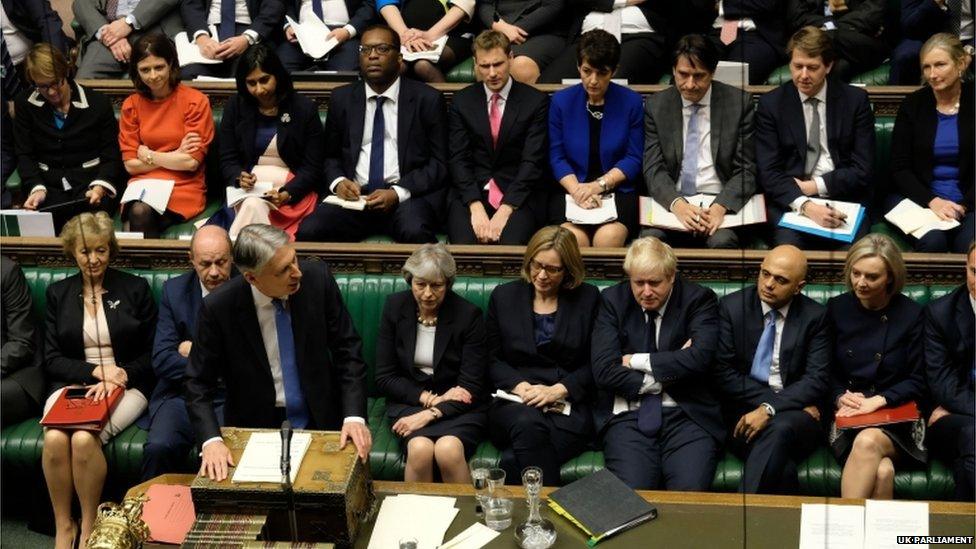
The Commons will spend most of its remaining sittings in 2017 yomping through the detail of the EU (Withdrawal) Bill and debating the Budget, with the resulting Finance Bill for dessert...
But there are a couple of other big parliamentary issues coming up this week.
Tuesday marks the deadline set by Mr Speaker for the publication of the Brexit papers, the government's 58 studies examining the economic impact of Brexit.
MPs backed a Labour motion calling for these to be published at the beginning of November, and Mr Bercow has warned that ministers need to provide a response "very promptly indeed".
The government "expects" the papers will be provided, in some form, to Hilary Benn's Brexit select committee on Tuesday (note this falls short of an outright commitment) - but there will certainly be a major row, and possibly a formal Contempt of Parliament motion, if they don't appear, or are not provided in a satisfactory form. The chances are that this will fizzle out with a bit of sulkiness on both sides of the argument, but watch this space.
And on Friday, the Commons turkeys may stage a festive vote against an early Christmas - by backing a private member's bill to cancel the cull of MPs promised by the Conservatives, when they pledged to reduce the size of the House from 650 to 600 seats.
The reduction and the associated boundary review would have changed the dynamics of the next election, levelling the electoral playing field, or gerrymandering it, depending on your political viewpoint.
Elsewhere the Treasury Committee, with the determinedly independent-minded Nicky Morgan in the chair, will be holding a series of hearings into the Budget, covering its housing provisions on Tuesday, getting the verdict of economic experts on Wednesday; and of the Office for Budget Responsibility Chair Robert Chote on Thursday - before they speak to the Chancellor himself, the Wednesday after next.
Monday

Gavin Williamson pictured on board HMS Queen Elizabeth
The debut for the new secretary of state, Gavin Williamson, at Defence questions at 2.30pm. Mr Williamson, as chief whip, and before that David Cameron's parliamentary aide, rarely spoke in the Chamber, external - his last contribution of any kind was to present a petition on green belt development in his constituency, on 19 April 2016.
Any ministerial statements or urgent questions will follow at 3.30pm - it's possible the prime minister will report back on the latest EU Council meeting, and the Business Secretary, Greg Clark, may make a statement on his Industrial Strategy White Paper, external, which will address four 'grand challenges': artificial intelligence and the data economy; clean growth; healthy ageing; and the future of mobility.
The day's Ten Minute Rule Bill, from the SNP's Dr Philippa Whitford, is on universal credit. Even with the changes the Chancellor announced to UC in the Budget, Dr Whitford believes there is a need for much more flexibility in the way UC operates, for example to give claimants a longer repayment period for any advances made to tide them over when they first go onto the benefit.
And she is particularly interested in ensuring that the system should not contribute to isolating women in abusive relationships, by routing all the payments to their partner.
The main event is the continuation of the Budget Debate - on the theme of Britain and the world, a heading which encompasses everything from post-Brexit trade opportunities to global environmental issues (Tory sources are keen to stress the green aspects of the Budget); to a continued engagement in world affairs, after Brexit.
The day ends with an adjournment debate led by the Lib Dem former health minister, Norman Lamb, on NHS continuing healthcare. He picks up on recent reports about the failings in this part of the NHS, which is designed to provide care packages support people with complex long term conditions.
Some clinical commissioning groups are refusing to fund packages which cost more than residential care.
In Westminster Hall (4.30 pm), the Petitions Committee has organised a debate on e-petition 182953, external which says: "University fees are rising more and more. £9,000 for university fees is too high and the stress of being in debt is what puts individuals off applying for degrees. Now that grants have been removed it makes it difficult for families who need financial support but can't get that anymore."
The petition, which closed early because of the snap election, attracted 164,166 signatures.
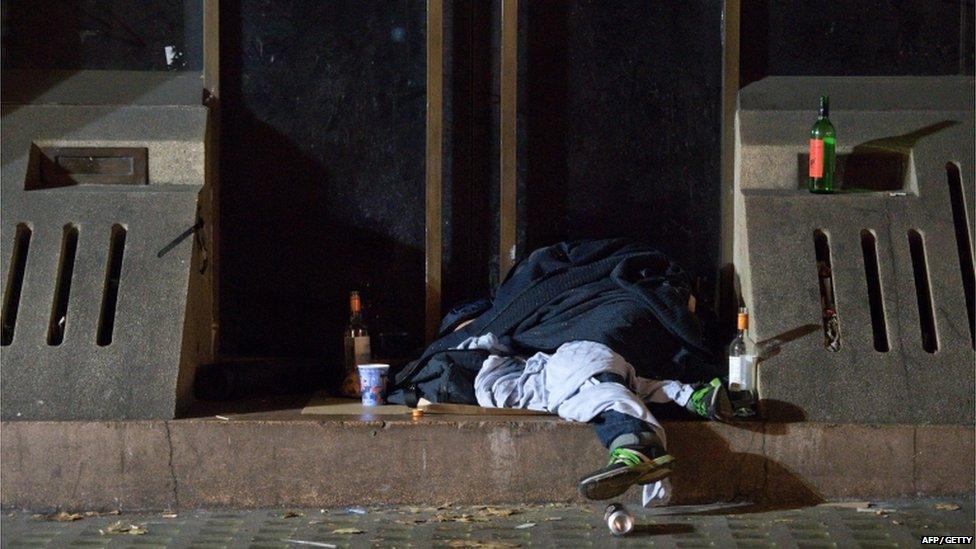
On the committee corridor, there are two hearings about homelessness - at 4pm, the Communities and Local Government Committee looks at the implementation of the Homelessness Reduction Act, external, which may well be the most significant private member's bill to pass into law since the 1960s...it is due to come into effect next April and puts new duties on local councils to help people in danger of becoming homeless.
The committee will hear from charities like Crisis and Shelter, plus a series of local councillors and the Minister for Local Government, Marcus Jones
Meanwhile, the Public Accounts Committee has a hearing (also 4pm) on homeless households, based on this National Audit Office report, external which notes that the number of rough sleepers has more than doubled since 2010, and that the number of homeless households in temporary accommodation has risen from fewer than 49,000 in March 2011 to around 77,000 in March 2017 with 70% in London.
Witnesses include top officials from the Department for Work and Pensions, and the Department for Communities and Local Government, the Mayor of Hackney and the Local Government Ombudsman.
In the Lords (2.30pm) question time ranges across including measures to prevent violence against women and girls in the proposed Domestic Violence and Abuse Bill, external, and another on police resources to support victims of domestic violence, and another on establishing a register of serial stalkers.
A series of short debates follow: first, on the implementation of the Department for International Development's economic development strategy, then on a comprehensive strategy for life-long learning and adult re-skilling in response to the changing nature of work; and finally on increasing the export of goods and services to Africa and the Commonwealth.
Tuesday
The Commons meets (11.30am) for Treasury questions. And with the final day's debate on the Budget due, the Chancellor will probably not stray from the Chamber as his Conservative colleague, Heidi Allen, presents a Ten Minute Rule Bill to equalise the way child maintenance is calculated based on the incomes of employed and self-employed parents.
She believes it is far too easy for an "errant parent" to avoid paying maintenance by hiding behind self-employed status. This allows them to conceal income in dividends and assets, denying their child the financial support and often forcing the parent with the caring role onto benefits. She says her bill aims to close that loophole and end "a double hit to the taxpayer".
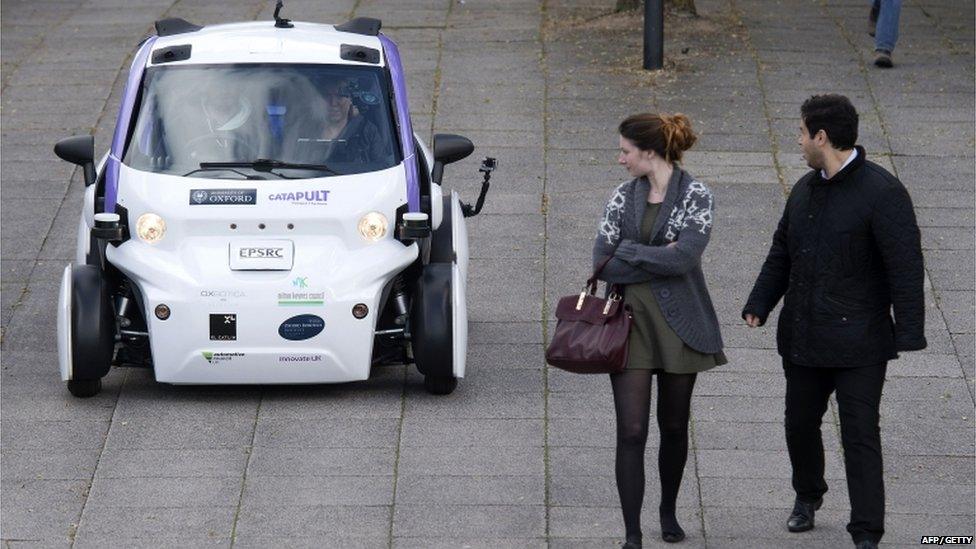
The Budget will be discussing the promotion of new technologies, like this driverless car
Then, the Budget debate concludes, with the section dealing with the future economy, including the measures, like Tech Hubs, to promote new technologies and improve the national infrastructure and education. (The Finance Bill, which will implement the Budget measures, comes up for second reading on Monday 11 December.)
In Westminster Hall, Labour's Ian Murray leads a debate on Dr Elsie Inglis and the contribution of women to World War I (9.30am-11am). Dr Inglis was a Suffragist and was the driving force behind the Scottish Women's Hospitals for Foreign Service Committee, which provided all-woman staffed relief hospitals for the war effort, sending teams to Belgium, France, Serbia and Russia.
The next subject (11am-11.30am) is voter registration in the Nottingham North constituency. Its new MP, Labour's Alex Norris, is concerned about low levels of registration, and wants to look at ways of increasing take-up, and boosting voter engagement.
Dr Roberta Blackman-Woods leads a debate (2.30pm-4pm) on the continuing Rohingya refugee crisis, followed by the Conservative Mary Robinson (4pm-4.30pm) on charitable fundraising websites. She's concerned that some websites are run by profit-making companies, and not all the money they raise goes to the charities. The Civil Society Minister, Tracey Crouch, is expected to respond.
Finally, Plaid Cymru's Ben Lake leads a debate (4.30pm-5.30pm) on the future of the rural economy in Wales.
In the Lords (2.30pm) question time covers the particular difficulties faced by children and vulnerable young people in accessing mental health care and improving air quality in Britain.
The third reading of the Space Industry Bill, external should be a brief rubber-stamping exercise, before peers return to the detail of the Telecommunications Infrastructure (Relief from Non-Domestic Rates) Bill,, external which is so uncontroversial it has prompted just one amendment.
That leaves plenty of time for two short debates. The first, sees Labour's Lord Boateng lead a debate on improving mental health services for people from black and ethnic minority communities; next, is a debate on the future of the Royal Marines, rumoured to be under threat in the latest round of defence cuts.
It's led by the Lib Dem, Lord Burnett, who served as a Royal Marine commando for seven years. The eleven peers down to speak represent quite a decent number for a debate of this kind.
Wednesday
The Commons opens at 1.30 pm, with International Development questions, followed at noon by Prime Minister's Questions.
Labour's Emma Lewell-Buck then continues a parliamentary campaign she's been running for a while, with a Ten Minute Rule Bill aimed at establishing an official measure of hunger in the UK. The government already conducts regular surveys of eating habits, she says, and she wants questions to be included on how often people go without food or experience serious hunger. The US Department of Agriculture already carries out a survey along these lines, and if a UK survey reveals the level of hunger she expects, she hopes it would force the government to act.
The day's main debate will be on an SNP motion - about which they're being pretty cagey, so they're probably seeking some subject with cross-party appeal. Will they be seeking to lure Conservative, or maybe Labour dissidents, or might they be setting a trap for the Scottish Tories, who're rather preening themselves after the Chancellor praised their pre-budget lobbying efforts for various Scottish causes?
In Westminster Hall (9.30am) the former immigration minister Mark Harper leads a debate on the effect of the government's migration policy on the economy - the main points he will cover are the link between migration and productivity, and some ideas on what the UK's post-Brexit migration policy should look like. Despite all the Brexit focus, he says, we haven't actually talked about future migration policy much.
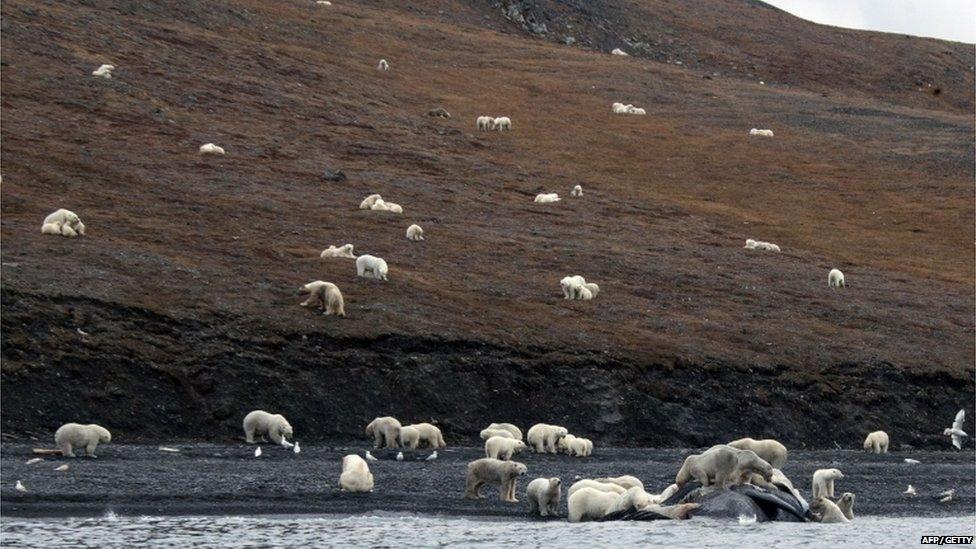
Polar bears gather around the carcass of a bowhead whale on the shore of Russia's Wrangel Island
The SNP's Douglas Chapman has a debate on the appointment of a UK Arctic Ambassador (11am). The new ambassador would deal solely with Arctic issues, including the environment, trade, defence and social policy. He believes there is a great opportunity to develop relationships with Arctic nations. Mr Chapman says appointing an ambassador would highlight that the UK values the Arctic and support the nations that protect it and the peoples who live there.
The Lib Dem Layla Moran has a debate (4pm-4.30pm) on access to sanitary products - she is backing a cross party campaign for free provision in schools which will cost an estimated maximum of £10m to deliver. One concern is that many students miss school because they don't have access to sanitary products.
Conservative Sheryll Murray raises the issue of Cornwall's dark skies status - the effort to preserve views of the night sky by limiting light pollution from badly-configured street lighting (4.30pm-5.30 pm).
In the Lords (2.30pm), questions to ministers cover tuition fees of nurses who spend some years working in the NHS or related care services, budget savings on interpretation and translation services in courts, and the impact of the new system of apprenticeship training
Then peers move onto their second day of detailed committee stage consideration of the Sanctions and Anti-Money Laundering Bill, external. This does not seem to be attracting vast number of amendments, but there is some quite high-powered stuff about sanctions for failing to prevent money-laundering, from the Lib Dems Baroness Bowles of Berkhamsted and Baroness Kramer.
Thursday
In the Commons (9.30am) the day begins with Transport questions. That will be followed by the regular Business Statement, from the Leader of the Commons, Andrea Leadsom.
The main debates are on two motions chosen by the Backbench Business Committee - so both will have cross party support: first, there's a toughly-worded motion from Labour's Clive Lewis expressing "deep concern" over the treatment of small and medium-sized enterprises by the Global Restructuring Group of the Royal Bank of Scotland. The motion calls for an independent inquiry into the treatment of SMEs by financial institutions.
The second debate is on mental health and suicide in the autism community - the motion, proposed by the SNP's Dr Lisa Cameron, calls for better coordination and services to create "effective and research-based mental health pathways", for autistic people.
In Westminster Hall, there is a general debate on deafness and hearing loss led by Labour MP Jim Fitzpatrick.
In the Lords (11am), questions to ministers include a number inspired by World Aids day on 1 December - the subjects include supporting young people as partners, leaders and advocates within the global response to HIV and the effect of reductions to the public health grant since 2015-16 on access to sexual health services and HIV prevention services.
The main debate is on the impact of the government's fiscal policies on the recruitment, retention and conditions of NHS staff.
Friday
It's private members' bill day in the Commons (from 9.30am) - and the first order of business is the second reading debate on the Parliamentary Constituencies (Amendment) Bill, external, from Labour's Afzal Khan.
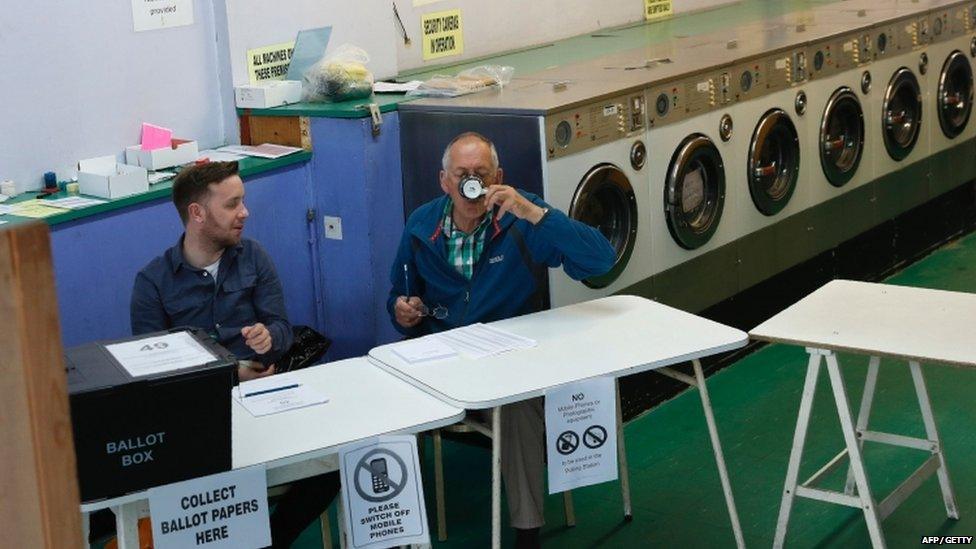
As I write, no text has been published for this measure - which, of itself, is probably going to prompt complaints. But I'm told the bill will seek to trigger a new boundary review equalising the size of constituencies, but based on keeping the size of the Commons at 650 MPs, and abandoning the government's plans to reduce it to 600.
A number of Conservatives don't like the prospect of their seats being abolished, and having to compete against colleagues in selection battles for new seats, if they want to remain in Parliament - some are so opposed may even vote with Labour on the issue, and many more may prove resistant to any attempt to whip them against the bill.
A key factor is that the DUP do not support boundary reorganisation in Northern Ireland. So Labour sense a chance to block a measure that would damage their chances at the next election, if they can offer a well-crafted alternative. The main hazard for them may be over-ambition, for example, attempting to add on votes at 16....
Expect all the usual tricks - early motions to sit in private, long time-wasting speeches, and a massing of Labour MPs to attempt a closure motion and force a second reading vote. The government may fall back on the tactic of declining to vote - although doing that on a bill rather than an Opposition motion simply means the bill goes to the next stage of consideration.
If the votes at 16 debate was bad tempered, a few weeks ago, this one could get even nastier.
There are plenty of other bills further down the agenda - the Prisons (Interference with Wireless Telegraphy) Bill, external and the Local Authorities (Removal of Council Tax Restrictions) Bill, external for example.
But unless the first Bill is, for some reason, pulled, there is unlikely to be much time to debate them. Even so, there is a possibility one or more of them might be given a formal second reading, without debate. This happens at 2.30pm when the list of undebated bills is read out by a clerk - if there is no shout of "object" they are deemed to have passed second reading and go on to committee consideration.
The Lords are not sitting.